Charles E W Bean, Diaries, AWM38 3DRL 606/276/1 - 1928-1937 - Part 15
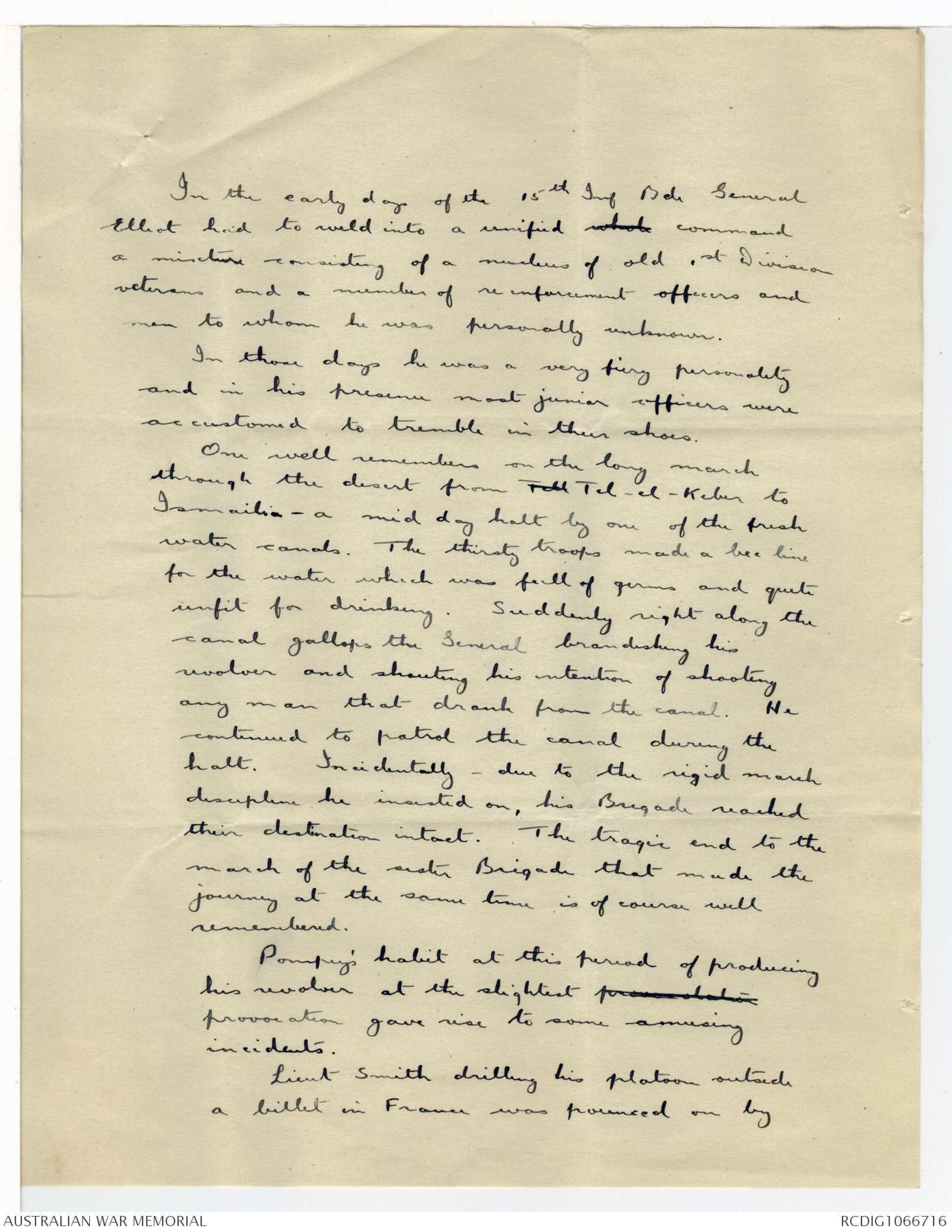
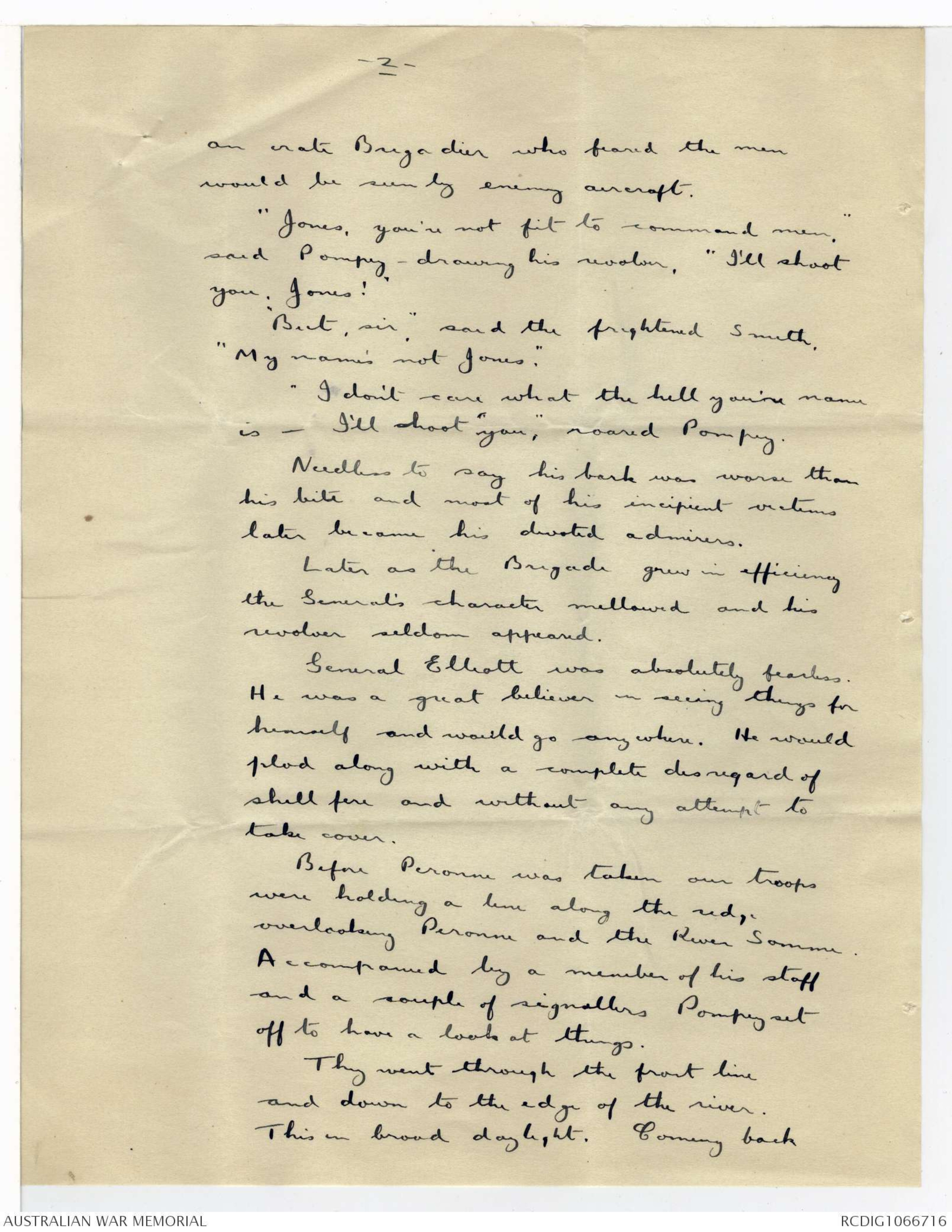
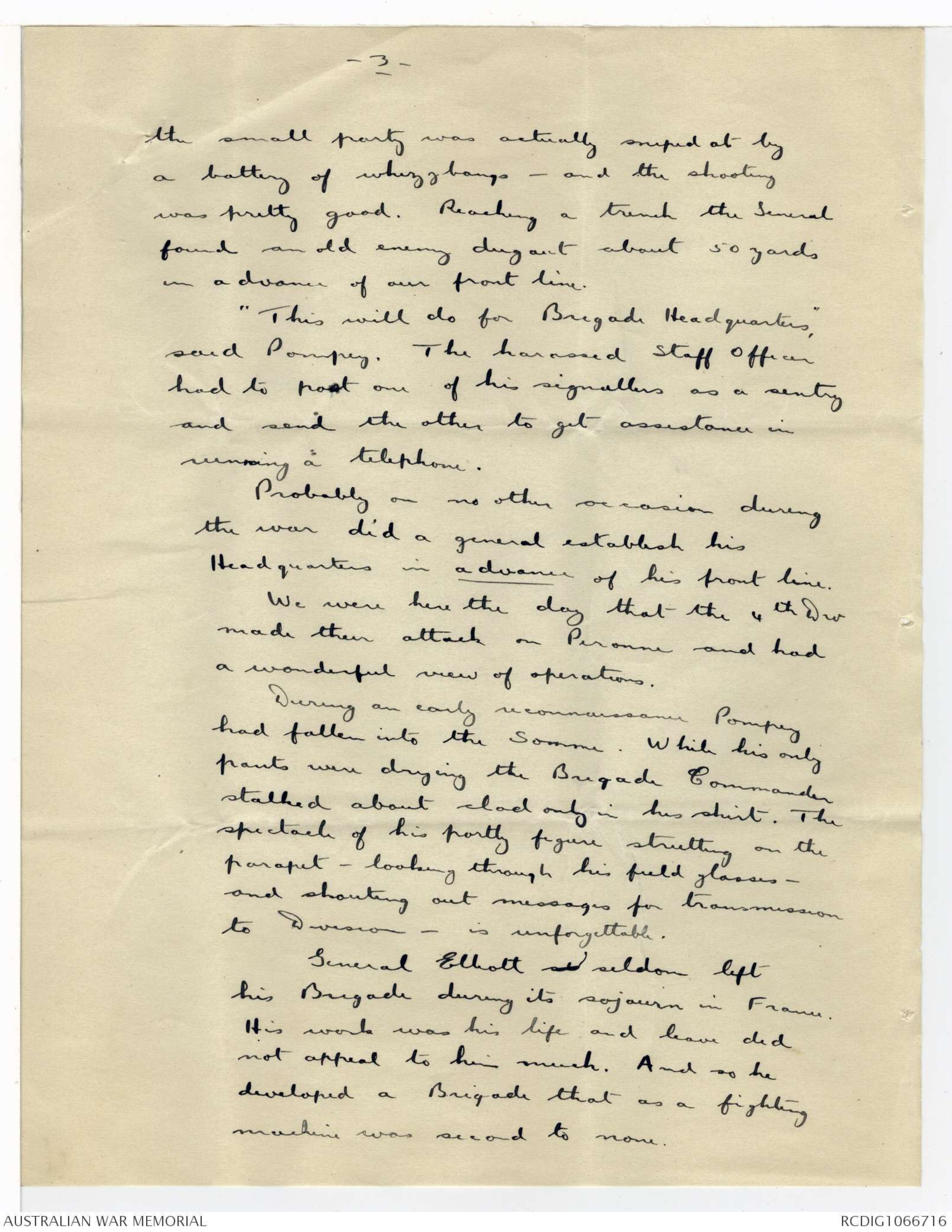
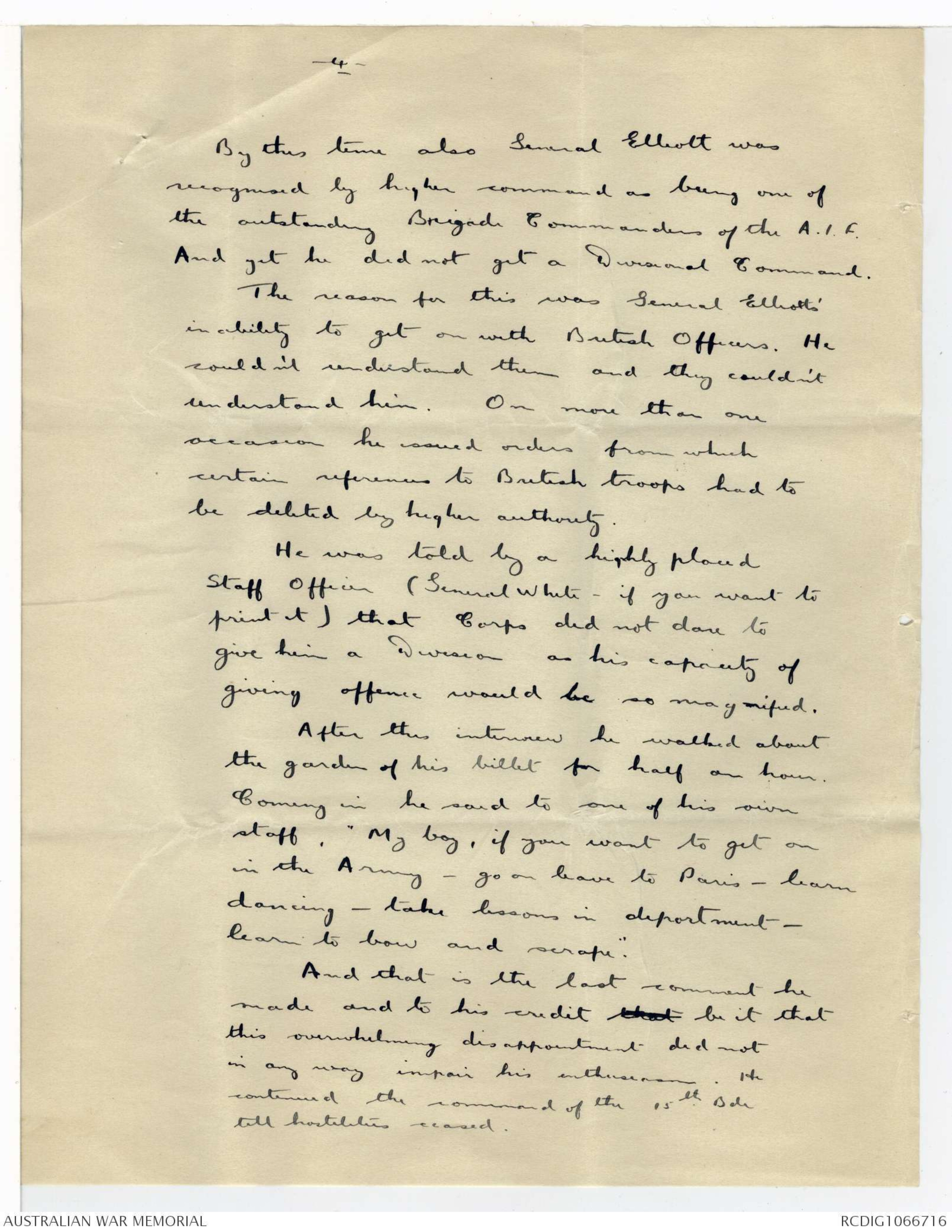
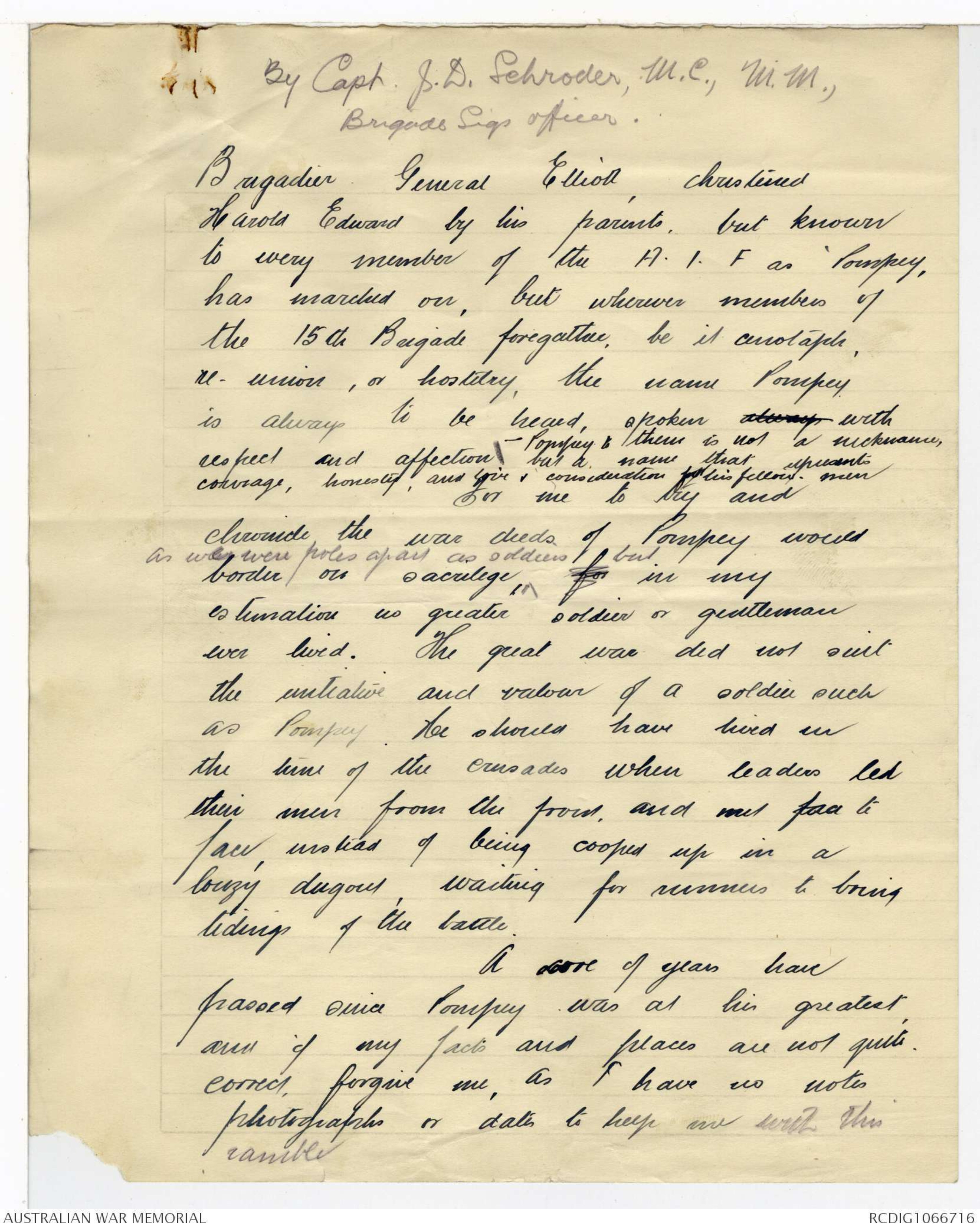
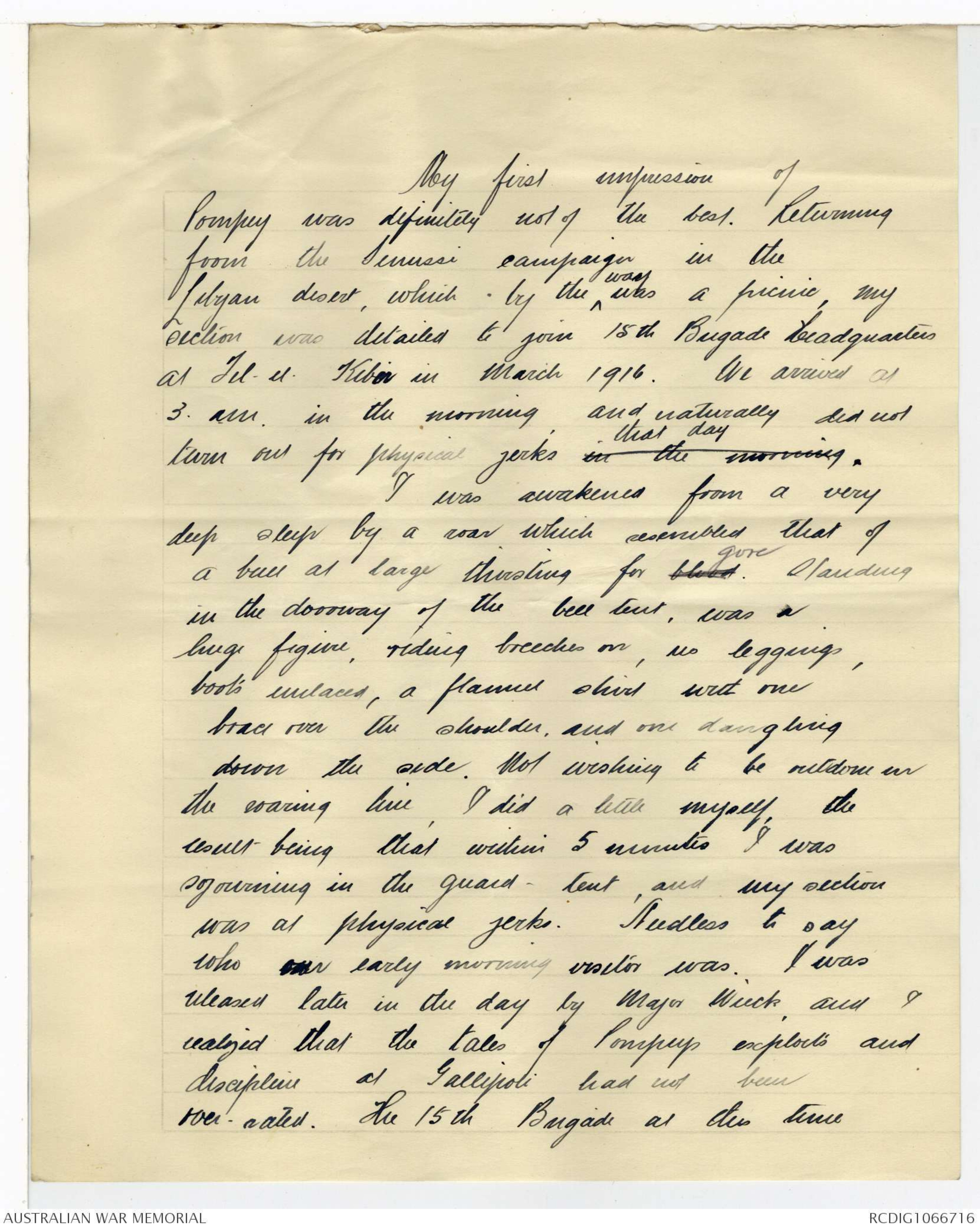
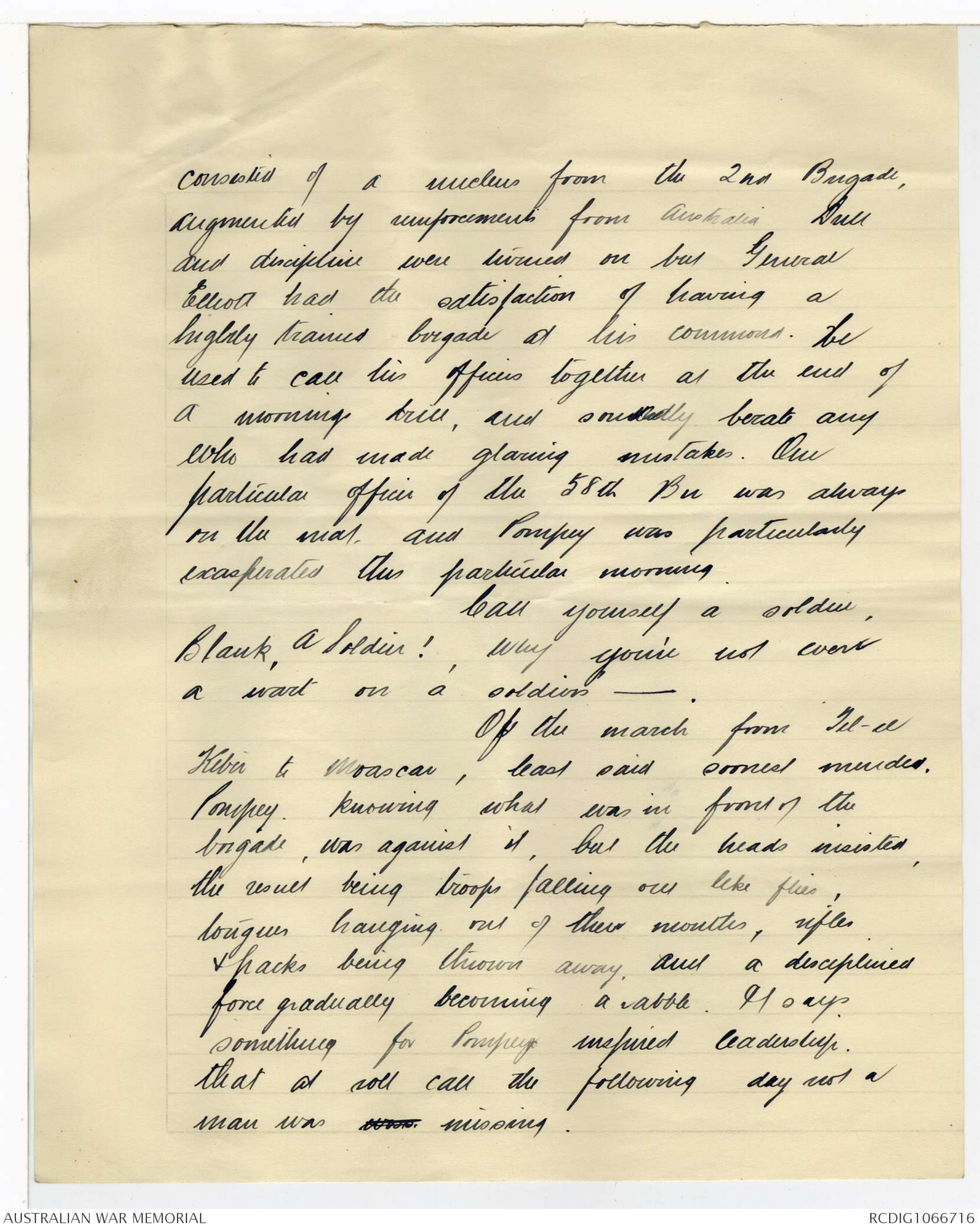
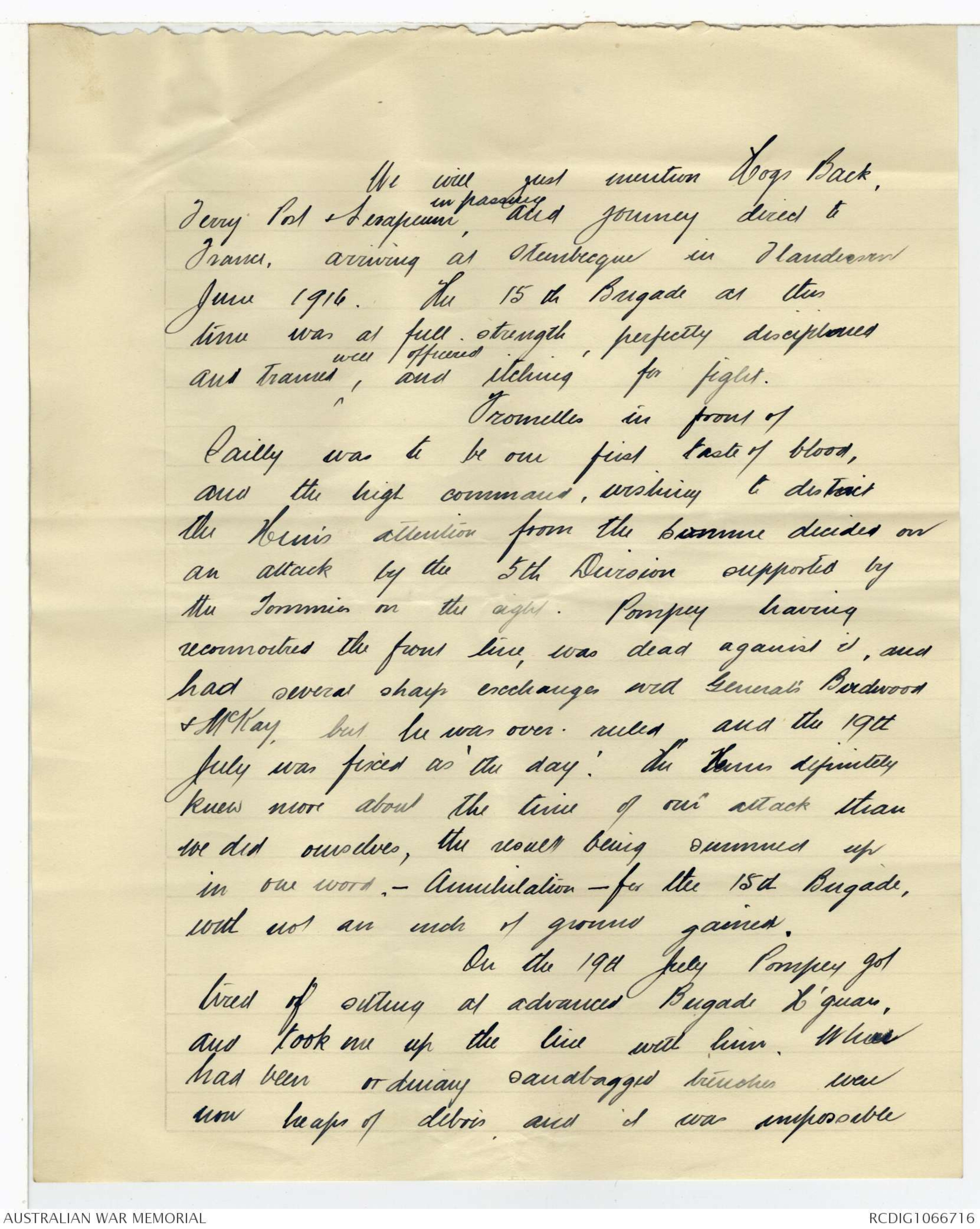
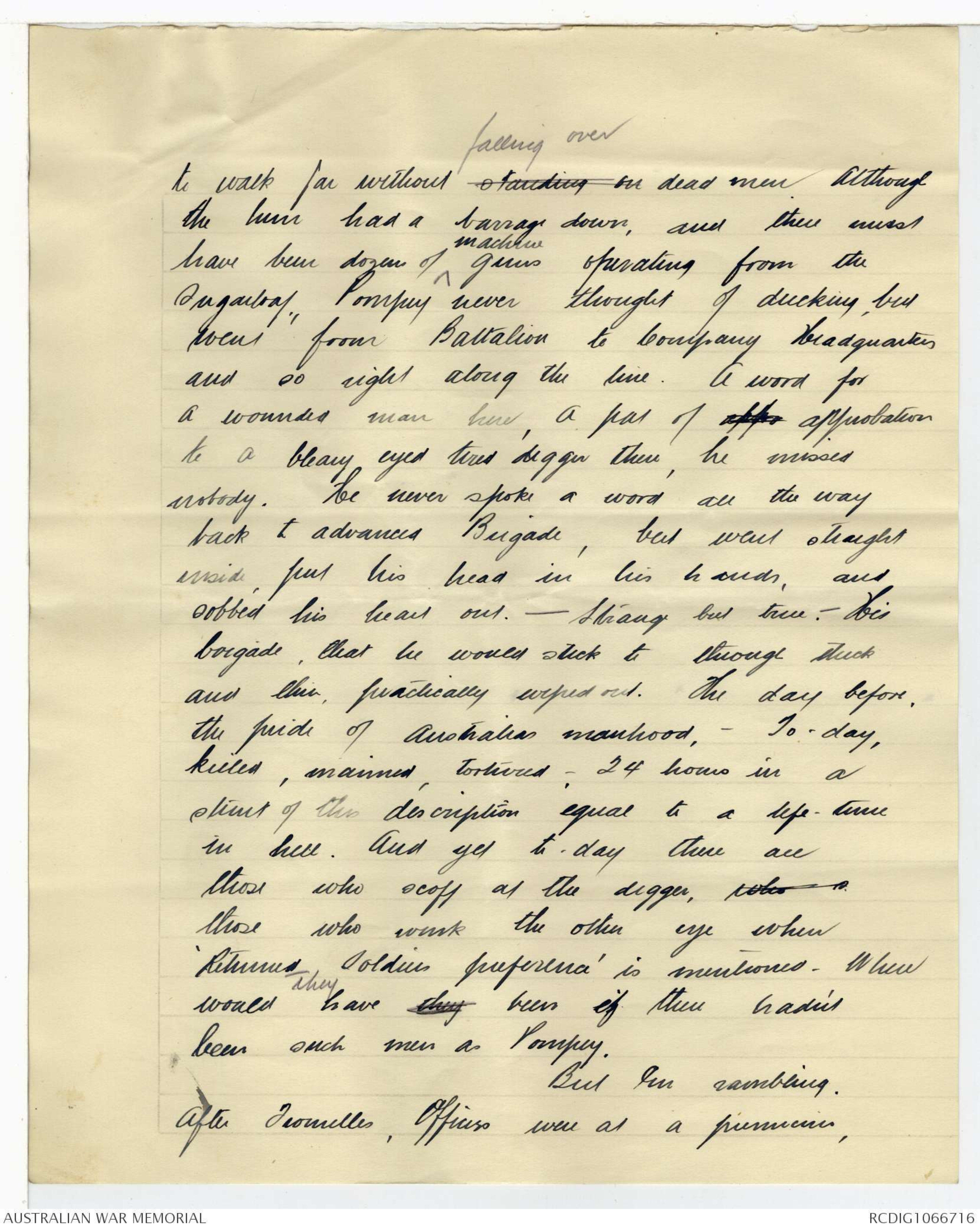
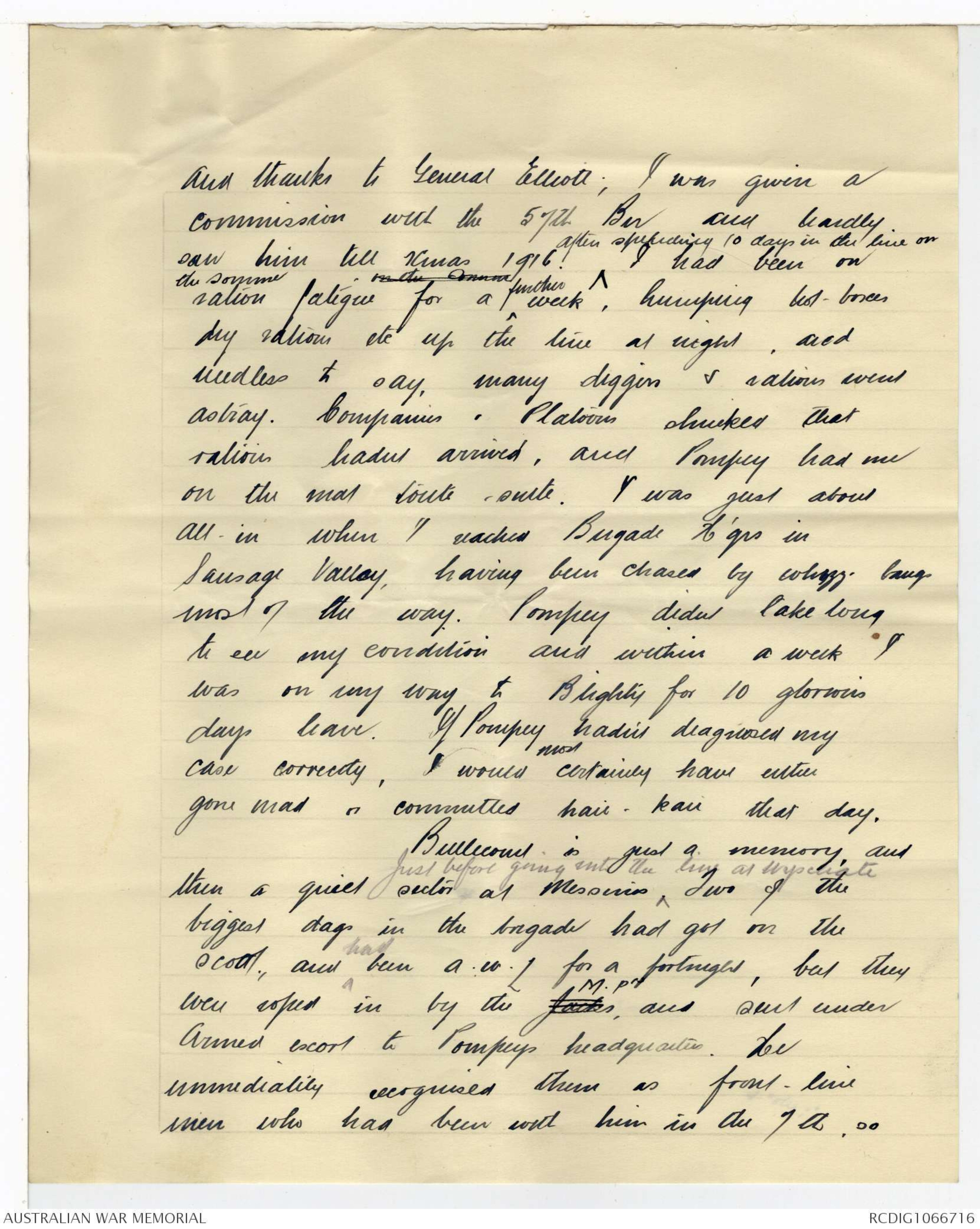
In the early days of the 15th Inf Bde General
Elliot had to weld into a unified whole command
a mixture consisting of a nucleus of old 1st Division
veterans and a number of reinforcement officers and
men to whom he was personally unknown.
In those days he was a very fiery personality
and in his presence most junior officers were
accustomed to tremble in their shoes.
One well remembers on the long march
through the desert from Tell Tel-el-Kebir to
Ismailia - a mid day halt by one of the fresh
water canals. The thirsty troops made a bee line
for the water which was full of germs and quite
unfit for drinking. Suddenly right along the
canal gallops the General brandishing his
revolver and shouting his intention of shooting
any man that drank from the canal. He
continued to patrol the canal during the
halt. Incidentally - due to the rigid march
discipline he insisted on, his Brigade reached
their destination intact. The tragic end to the
march of the sister Brigade that made the
journey at the same time, is of course will
remembered.
Pompey's habit at this period of producing
his revolver at the slightest prxxxxxxxx
provocation gave rise to some amusing
incidents.
Lieut Smith drilling his platoon outside
a billet in France was pounced on by
-2-
an irate Brigadier who feared the men
would be seen by enemy aircraft.
"Jones, you're not fit to command men,"
said Pompey - drawing his revolver, "I'll shoot
you, Jones!"
"But, sir," said the frightened Smith,
"My name's not Jones."
"I don't care what the hell you're name
is - I'll shoot "you," roared Pompey.
Needless to say his bark was worse than
his bite and most of his incipient victims
later became his devoted admirers.
Later as the Brigade grew in efficiency
the General's character mellowed and his
revolver seldom appeared.
General Elliott was absolutely fearless.
He was a great believer in seeing things for
himself and would go anywhere. He would
plod along with a complete disregard of
shell fire and without any attempt to
take cover.
Before Peronne was taken our troops
were holding a line along the ridge
overlooking Peronne and the River Somme.
Accompanied by a member of his staff
and a couple of signallers Pompey set
off to have a look at things.
They went through the front line
and down to the edge of the river.
This in broad day light. Coming back
-3-
the small party was actually sniped at by
a battery of whizzbangs - and the shooting
was pretty good. Reaching a trench the General
found an old enemy dugout about 50 yards
in advance of our front line.
"This will do for Brigade Headquarters."
said Pompey. The harassed Staff Officer
had to post one of his signallers as a sentry
and send the other to get assistance in
running a telephone.
Probably on no other occasion during
the war did a general establish his
Headquarters in advance of his front line.
We were here the day that the 4th Div
made their attack on Peronne and had
a wonderful view of operations.
During an early reconnaissance Pompey
had fallen into the Somme. While his only
pants were drying the Brigade Commander
stalked about clad only in his shirt. The
spectacle of his portly figure strutting on the
parapet - looking through his field glasses -
and shouting out messages for transmission
to Division - is unforgettable.
General Elliott se seldom, left
his Brigade during its sojourn in France.
His work was his life and leave did
not appeal to him much. And so he
developed a Brigade that as a fighting
machine was second to none.
-4-
By this time also General Elliott was
recognised by higher command as being one of
the outstanding Brigade Commanders of the A.I.F.
And yet he did not get a Divisional Command.
The reason for this was General Elliotts'
inability to get on with British Officers. He
couldn't understand them and they couldn't
understand him. On more than one
occasion he issued orders from which
certain references to British troops had to
be deleted by higher authority.
He was told by a highly placed
Staff Officer (General White - if you want to
print it) that Corps did not dare to
give him a Division as his capacity of
giving offence would be so magnified.
After this interview he walked about
the garden of his billet for half on hour.
Coming in he said to one of his own
staff. "My boy, if you want to get on
in the Army - go on leave to Paris - learn
dancing - take lessons in deportment -
learn to bow and scrape."
And that is the last comment he
made and to his credit that be it that
this overwhelming disappointment did not
in any way impair his enthusiasm. He
continued the command of the 15th Bde
till hostilities ceased.
By Capt. J.D. Schroder, M.C, M.M.,
Brigade Sigs officer.
Brigadier General Elliott, christened
Harold Edward by his parents, but known
to every member of the A.I.F. & as 'Pompey,
has marched on, but wherever members of
the 15th Brigade foregather, be it cenotaph,
re-union, or hostelry, the name Pompey
is always to be heard, spoken always with
respect and affection - Pompey to them is not a nickname, but a name that represents
courage, honesty and love & consideration for his fellow-men
For me to try and
chronicle the war deeds of Pompey would
border on sacrilege, ^as we were poles apart as soldiers but for in my
estimation no greater soldier or gentleman
ever lived. The great war did not suit
the initiative and valour of a soldier such
as Pompey. He should have lived in
time of the crusades when leaders led
their men from the front, and met face to
face, instead of being cooped up in a
lousy dugout, waiting for runners to bring
tidings of the battle.
A score of years have
passed since Pompey was at his greatest,
and if my facts and places are not quite
correct, forgive me, as I have no notes
photographs or dates to keep me with this
ramble
My first impression of
Pompey was definitely not of the best. Returning
from the Senussi campaign in the
Libyan desert, which by the ^way was a picnic, my
section was detailed to join 15th Brigade Headquarters
at Tel-el-Kebir in March 1916. We arrived at
3. am. in the morning and naturally did not
turn out for physical jerks in the morning that day.
I was awakened from a very
deep sleep by a roar which resembled that of
a bull at large thirsting for blood gore. Standing
in the doorway of the bell tent, was a
huge figure, riding breeches on, no leggings,
boots unlaced, a flannel shirt with one
brace over the shoulder, and one dangling
down the side. Not wishing to be outdone in
the roaring line, I did a little myself, the
result being that within 5 minutes I was
sojourning in the guard - tent, and my section
was at physical jerks. Needless to say
who our early morning visitor was. I was
released later in the day by Major Wieck and I
realized that the tales of Pompeys exploits and
discipline at Gallipoli had not been
over-rated. The 15th Brigade at this time
consisted of a nucleus from the 2nd Brigade,
augmented by reinforcements from Australia. Drill
and discipline were [[turned?]] on but General
Elliott had the satisfaction of having a
highly trained brigade at his command. He
used to call his officers together at the end of
a morning drill, and soundly berate any
who had made glaring mistakes. One
particular officer of the 58th Bn was always
on the mat and Pompey was particularly
exasperated this particular morning.
Call yourself a soldier,
Blank, a Soldier! Why you're not even
a wart on a soldiers' _____.
Of the march from Tel-el
Kebir to Moascar, least said soonest mended.
Pompey, knowing what was in front of the
brigade, was against it, but the heads insisted,
the result being troops falling over like flies,
tongues hanging out of their months, rifles
& packs being thrown away, and a disciplined
force gradually becoming a rabble. It says
something for Pompeys inspired leadership,
that at roll call the following day not a
man was was missing.
We will just mention Hogs Back.
Ferry Post & Serapeum in passing and journey direct to
France, arriving at Steenbecque in Flanders in
June 1916. The 15th Brigade at this
time was at full strength, perfectly disciplined
and trained ^well, officered and itching for fight.
Fromelles in front of
Sailly was to be our first taste of blood,
and the high command, wishing to distract
the Hun's attention from the Somme decided on
an attack by the 5th Division supported by
the Tommies on the right. Pompey having
reconnoitred the front line, was dead against it, and
had several sharp exchanges with General's Birdwood
& McKay, but he was over-ruled and the 19th
July was fixed as 'the day'. The Huns definitely
knew more about the time of our attack than
we did ourselves, the result being summed up
in one word - Annihilation - for the 15th Brigade
with not an inch of ground gained.
On the 19th July Pompey got
tired of sitting at advanced Brigade H'quars,
and took me up the line will him. Where
had been ordinary sandbagged trenches were
now heaps of debris, and it was impossible
to walk far without standing on falling over dead men. Although
the hum had a barrage down, and there must
have been dozen of ^machine guns operating from the
Sugarloaf, Pompey never thought of ducking but
went from Battalion to Company Headquarters
and so right along the line. A word for
a wounded man here, a pat of appo approbation
to a bleary eyed tired digger there, he missed
nobody. He never spoke a word all the way
back to advances Brigade, but went straight
inside, put his head in his hands, and
sobbed his heart out. - Strange but true - His
brigade, that he would stick to through thick
and thin, practically wiped out. The day before
the pride of Australias manhood, - To-day,
killed, maimed, tortured, - 24 hours in a
stunt of this description equal to a life-time
in hell. And yet to-day there are
those who scoff of the digger, who w
those who wink the other eye when
'returned soldiers preference' is mentioned. When
would they have they been if there hadn't
been such men as Pompey.
But Im rambling.
After Fromelles, Officers were at a premium,
and thanks to General Elliott; I was given a
commission with the 57th Bn and hardly
saw him till Xmas 1916. ^After spending 10 days in the line on the Somme I had been on
ration fatigue on the Somme for a ^further week, humping hot-boxes
dry rations etc up the line at night, and
needless to say, many diggers & rations went
astray. Companies. Platoons shucked that
rations hadnt arrived, and Pompey had me
on the mat toute-suite. I was just about
all-in when I reached Brigade H'qrs in
Sausage Valley, having been chased by whizz-bangs
most of the way. Pompey didnt take long
to see my condition and within a week I
was on my way to Blighty for 10 glorious
days leave. If Pompey hadn't diagnosed my
case correctly, I would most certainly have either
gone mad or committed hari-kari that day.
Bellecourt is just a memory and
then a quiet sector at Messines ^just before going into the line at Wyschate. Two of the
biggest days in the brigade had got on the
scout, and ^had been A.W.L for a fortnight, but they
were roped in by the Jacks M.P, and sent under
armed escort to Pompeys headquarters. He
immediately recognised them as front-line
men who had been with him in the 7th, so
 Sam scott
Sam scottThis transcription item is now locked to you for editing. To release the lock either Save your changes or Cancel.
This lock will be automatically released after 60 minutes of inactivity.